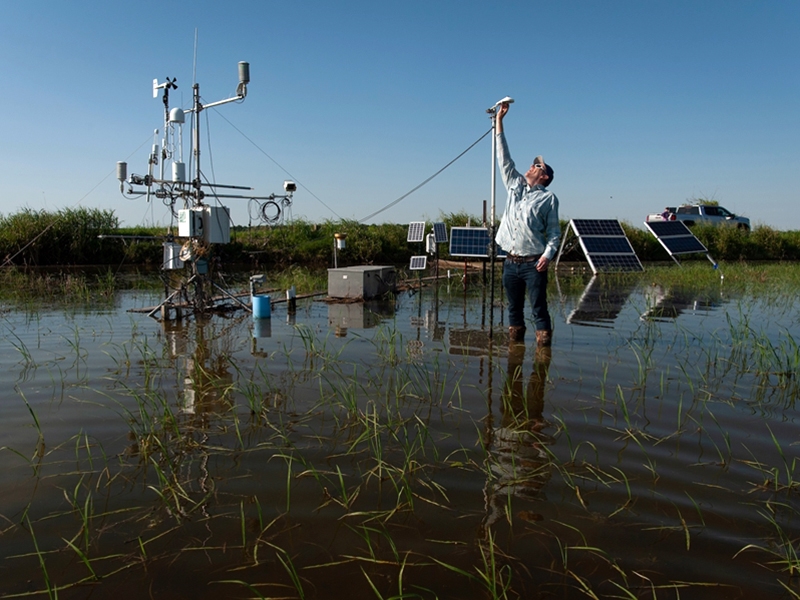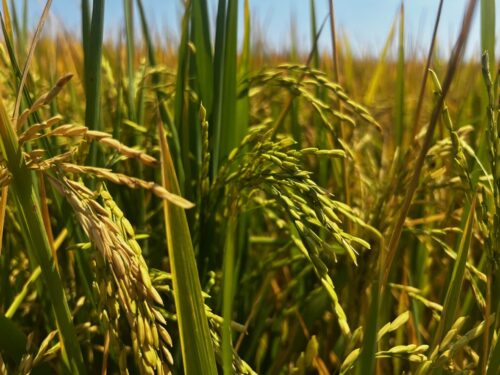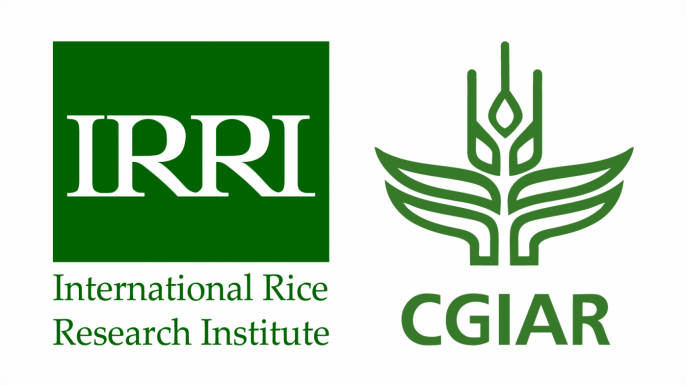Tags
Study Seeks to Refine Knowledge About Climate Impact of Rice Farming

Associate professor Ben Runkle checks a piece of equipment that helps researchers monitor conditions in a flooded rice field.
A new project led by pioneering biological and agricultural researcher Ben Runkle seeks to refine scientists’ understanding of how different rice-growing soils and irrigation conditions influence the production of methane, the potent greenhouse gas that is a primary contributor to climate change.
Rice is typically grown in clay-rich fields unsuitable for other agriculture but perfect for the worldwide food staple, which thrives in swampy conditions that also, unfortunately, produce plentiful methane gas. Flooding rice-growing fields also limits weed growth.
Runkle and others have been experimenting with allowing fields to dry out during the growing cycle rather than flooding them with water throughout. He and research collaborators have shown that farmers can reduce the methane produced by 64% or more without impacting yield by instituting carefully timed periods when rice fields are dried.
| The three-year project will help the National Resources Conservation Service decide incentives for farmers who implement mitigation strategies. |
A group led by Runkle recently received a $694,047 federal grant to further this research by exploring two areas of gaps in knowledge: how soil makeup and field slope impact these methane-reducing and water conservation strategies. The researchers also hope to show that differing rice cultivars have less influence on the amount of methane produced than other factors.
“We know from the past research that the soils of rice fields are very important in determining the greenhouse gas emissions that come off of those fields. What we don’t have a really strong handle on is how much,” Runkle said. “Rice can grow well in clay soil. What we’re trying to target is quantifying clay content of soil as the kind of master variable that will help us control methane emissions.”
The three-year research project is funded by the National Resources Conservation Service (NRCS). In addition to its grant, the U of A will provide a $291,084 match and Zero Grade Farms of England, Arkansas, will contribute in-kind use of its farm fields valued at $430,107.
The NRCS pays incentives to farmers who agree to various conservation practices, including those to reduce methane. The agency needs more information to help its staff make decisions about how to prioritize conservation activities among farmers, Runkle said. Runkle’s group will deliver a fact sheet, training materials and a technical report guiding the interpretation and implementation from the research findings, focusing on methane-reducing actions.

In the foreground, research associate Beatriz Moreno Garcia and associate professor Ben Runkle monitor equipment while taking measurements in a flooded rice field as part of their research into the climate impact of rice farming.
The project aims to both evaluate existing conversation practices and help the NRCS structure future conservation assistance under varied soil and irrigation conditions. It’s the first time in recent years that Runkle has received a technical assistance grant to produce research and guidelines for the NRCS.
“This type of technical assistance is new and exciting as a way to make an impact from our research. We will concurrently publish scientific papers from this data, but we will also translate that to forms that are accessible for farmers to implement,” he said.
The NRCS, which has agents in every county much like the Cooperative Extension System, will distribute the information to farmers. Arkansas is the country’s leading rice producer, growing about half of U.S. yield, with California, Louisiana, Mississippi, Missouri and Texas producing the other half.
Momentum has been building for scientifically backed mitigations to address climate change, particularly in the past three years or so, Runkle said. He is encouraged by recent political and economic attention to the problem and believes support is growing for agricultural practices to become part of the solution.
“There’s more money available to help us look at fleshing out the details of how some of these mitigation strategies can work to reduce uncertainties for farmers and help prioritize where agencies like NRCS should spend its money,” Runkle said.
Government agencies often aim for better outcomes by providing incentives to row crop agriculture to make changes, Runkle said. In addition to government interests, private-sector companies that sell rice-based products are interested in improving sustainability in their supply chain, he said.
“This research will help generalize our findings from field-scale measurements across the landscape, helping to improve our understanding of the system and ultimately helping producers,” said Michele Reba, research hydrologist with USDA-Agricultural Research Service-Delta Water Management Research Unit, and collaborator on this project and others with Runkle.
Zero Grade Farms Partner Mark Isbell said he is certain the new research will advance this critical area of study in the same way as past research Runkle, Reba and their teams have done on his family’s farm.
“We are seeing real change in this space as a result of this research, with farmers adopting new practices, private companies beginning to see the importance of supporting these practices to reduce their supply-chain footprints, and NRCS expanding activity in this area. The research that will be advanced by this new grant is the crucial next step in this process,” he said.
https://news.uark.edu/articles/69251/study-seeks-to-refine-knowledge-about-climate-impact-of-rice-farmingPublished Date: January 23, 2024






